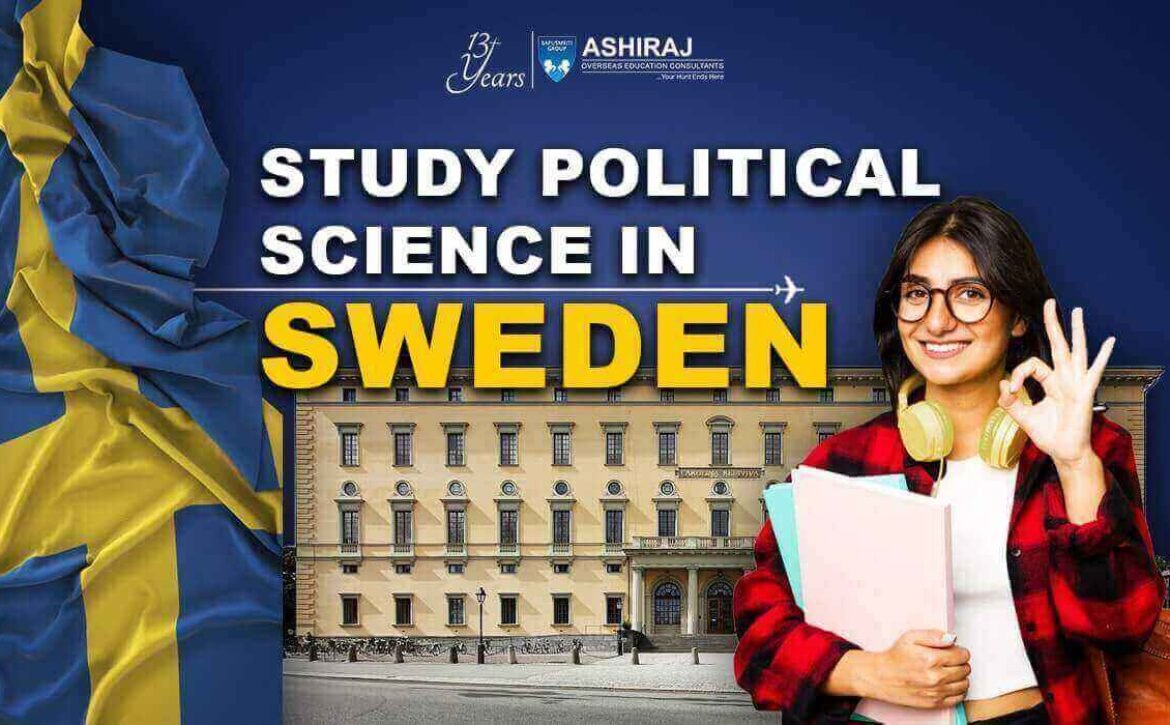
Political Science in Sweden
Political Science in Sweden delves into the intricate dynamics of the Swedish political landscape, renowned for its robust democratic traditions and progressive policies. Rooted in a rich history of political engagement and social welfare, Sweden’s approach to political science combines theoretical inquiry with empirical research, offering insights into governance, public policy, and international relations. With a strong emphasis on inclusivity and transparency, Swedish political science fosters critical analysis and discourse, shaping both domestic policymaking and global perspectives on democracy and governance.
In Sweden, Political Science serves as a cornerstone of academic inquiry and public discourse, elucidating the mechanisms driving political decision-making and societal change. Through interdisciplinary collaboration and rigorous research methodologies, scholars and practitioners in the field contribute to the ongoing evolution of Sweden’s democratic institutions and civic culture. From the study of parliamentary systems to the examination of social welfare models, Political Science in Sweden encompasses diverse areas of inquiry, reflecting the nation’s commitment to fostering informed citizenship and responsive governance.
Why to Study Political Science in Sweden?
- Progressive Democratic Tradition: Sweden boasts a long-standing commitment to democracy, providing an ideal environment to study political science within a real-world context.
- Cutting-edge Research: Swedish universities are renowned for their innovative research in political science, offering students access to the latest methodologies and insights.
- Global Perspective: Political science programs in Sweden emphasize international relations, providing students with a broad understanding of global governance and diplomacy.
- Interdisciplinary Approach: Swedish political science curriculum often integrates insights from sociology, economics, and law, fostering a holistic understanding of political systems.
- Practical Experience: Many programs offer internships and practical experiences within governmental and non-governmental organizations, allowing students to apply theoretical knowledge to real-world scenarios.
- Inclusive Learning Environment: Sweden’s commitment to equality and diversity extends to its educational institutions, providing an inclusive atmosphere for students from diverse backgrounds.
- Career Opportunities: Graduates of political science programs in Sweden are well-equipped for careers in government, diplomacy, academia, and international organizations.
Studying Political Science in Sweden offers a unique blend of academic rigor, practical experience, and global perspective, making it an enriching choice for students passionate about understanding and shaping the future of governance and democracy.
Top Universities to Study Political Science in Sweden
University | QS World University Ranking 2023 | Type of University | Average Annual Fees (SEK) | Programs Offered |
Lund University | 40 | Public | 0 (for EU/EEA citizens) | Bachelor’s, Master’s, and Ph.D. in Political Science, International Relations |
Stockholm University | 57 | Public | 0 (for EU/EEA citizens) | Bachelor’s, Master’s, and Ph.D. in Political Science, Governance |
Uppsala University | 81 | Public | 0 (for EU/EEA citizens) | Bachelor’s, Master’s, and Ph.D. in Political Science, Comparative Politics |
University of Gothenburg | 102 | Public | 0 (for EU/EEA citizens) | Bachelor’s, Master’s, and Ph.D. in Political Science, Public Policy |
Umeå University | 251-300 | Public | 0 (for EU/EEA citizens) | Bachelor’s and Master’s in Political Science, Political Theory |
Political Science in Sweden benefits from the diverse offerings of its top universities, each renowned for its academic excellence and research contributions. Lund University, Stockholm University, Uppsala University, University of Gothenburg, and Umeå University stand out for their comprehensive programs, encompassing various aspects of political science, from international relations to political theory. With affordable or no tuition fees for EU/EEA citizens and a commitment to fostering a conducive learning environment, these institutions attract students from around the world seeking to delve into the intricacies of political science in Sweden.
Course Curriculum for Political Science in Sweden
- Interdisciplinary Approach: Political Science courses in Sweden often integrate insights from sociology, economics, and law, providing students with a holistic understanding of political systems.
- Core Concepts: The curriculum covers fundamental concepts such as democracy, governance, power relations, and political ideologies, laying a strong theoretical foundation.
- Empirical Research: Students engage in empirical research projects, analyzing real-world political phenomena and developing critical analytical skills.
- International Perspective: Courses emphasize international relations, exploring Sweden’s role in global politics and addressing contemporary global challenges.
- Practical Experience: Many programs offer internships and fieldwork opportunities within governmental and non-governmental organizations, allowing students to apply theoretical knowledge in practical settings.
- Specialization Options: Students can choose from a range of specialization tracks, including comparative politics, public policy, political theory, and conflict resolution, tailoring their studies to their interests and career goals.
- Inclusive Learning Environment: The curriculum fosters an inclusive atmosphere, encouraging diverse perspectives and critical dialogue among students and faculty.
Political Science in Sweden offers a comprehensive and dynamic curriculum that equips students with the knowledge, skills, and practical experience necessary to understand and engage with the complexities of governance and democracy in Sweden and beyond.
Eligibility Criteria & Admission Requirements for MS in Political Science in Sweden
- Language Proficiency: Applicants are typically required to demonstrate proficiency in English by providing either IELTS or TOEFL scores. The minimum scores may vary depending on the university but generally range from 6.5 to 7.0 for IELTS and 90 to 100 for TOEFL.
- Standardized Tests: Many universities may require either GRE or GMAT scores as part of the application process. The minimum scores vary across institutions but usually range from 300 to 320 for GRE and 600 to 650 for GMAT.
- Academic Credentials: Applicants must hold a bachelor’s degree in a related field, such as political science, international relations, or a relevant social science discipline, from an accredited institution.
- Passport & Student Visa: International applicants need a valid passport and must obtain a student visa to study in Sweden.
- Academic Certificates: Applicants must submit official transcripts and academic certificates from previous educational institutions.
- Work Experience: While not always mandatory, some programs may prefer candidates with relevant work experience in politics, government, or related fields.
Test | Minimum Score |
IELTS | 6.5 – 7.0 |
TOEFL | 90 – 100 |
GRE | 300 – 320 |
GMAT | 600 – 650 |
Political Science in Sweden welcomes applicants who meet these eligibility criteria, ensuring a diverse and qualified student body dedicated to the study of politics and governance.
Documents Required for Studying Political Science in Sweden
- Passport: A valid passport is essential for international applicants to verify their identity and nationality.
- Letters of Recommendation (LOR): Two or more LORs from academic or professional referees endorsing the applicant’s academic abilities, character, and potential for success in the program.
- Statement of Purpose (SOP): A concise essay outlining the applicant’s academic background, research interests, career goals, and reasons for choosing Political Science in Sweden.
- Curriculum Vitae (CV): A detailed resume highlighting the applicant’s educational qualifications, work experience, research projects, publications, and any relevant achievements or extracurricular activities.
- Official High School Transcripts: Transcripts documenting the applicant’s academic performance in high school or equivalent education.
- Educational Certificates: Certificates verifying the completion of previous academic degrees, such as bachelor’s or master’s degrees, from accredited institutions.
- Work Experience Certificate: If applicable, a certificate confirming the applicant’s relevant work experience in politics, government, or related fields.
- Proof of Financial Resources: Evidence demonstrating the applicant’s ability to cover tuition fees, living expenses, and other costs associated with studying and living in Sweden, such as bank statements or scholarship award letters.
These documents are crucial for the admission process to Political Science programs in Sweden, ensuring that applicants meet the necessary academic and financial requirements to pursue their studies successfully.
Admission Process for Political Science in Sweden
- Research Universities: Begin by researching universities offering Political Science programs in Sweden, considering factors such as reputation, curriculum, faculty expertise, and location.
- Review Requirements: Thoroughly review the admission requirements for each university, including academic prerequisites, language proficiency tests (IELTS or TOEFL), and standardized test scores (GRE or GMAT).
- Prepare Documents: Gather the necessary documents, including transcripts, certificates, letters of recommendation (LOR), statement of purpose (SOP), curriculum vitae (CV), passport, and proof of financial resources.
- Submit Application: Complete the online application form for your chosen universities and submit the required documents before the specified deadline. Pay attention to any additional application fees or supplementary materials requested.
- Language Proficiency: If required, schedule and take the English language proficiency test (IELTS or TOEFL) and ensure your scores meet the minimum requirements.
- Standardized Tests: If necessary, register for and take the standardized tests (GRE or GMAT) and submit your scores to the universities.
- Interview (if applicable): Some universities may require an interview as part of the admission process. Prepare adequately by familiarizing yourself with the program, highlighting your qualifications, and articulating your academic and career goals.
- Receive Admission Decision: After completing the above steps, await the admission decision from the universities. Once accepted, follow the instructions provided to confirm enrollment, apply for a student visa, and prepare for your studies in Political Science in Sweden.
Navigating the admission process for Political Science programs in Sweden requires careful planning, attention to detail, and timely submission of required documents to ensure a smooth transition into higher education.
“Education is the most powerful weapon which you can use to change the world.”
Nelson Mandela
Cost of Political Science Course in Sweden
- Tuition Fees: For EU/EEA citizens, tuition fees for Political Science programs in Sweden are often minimal or non-existent at public universities. However, non-EU/EEA students may face higher tuition fees, which vary depending on the university and program.
- Living Expenses: While tuition fees may be low, students should budget for living expenses, including accommodation, food, transportation, and personal expenses. The cost of living in Sweden can be relatively high, particularly in major cities like Stockholm and Gothenburg.
- Accommodation: Renting accommodation, whether through university dormitories or private rentals, constitutes a significant portion of the cost of living. Shared accommodation or student housing options may help reduce expenses.
- Health Insurance: International students are typically required to have health insurance while studying in Sweden. This may be provided through the Swedish healthcare system or private insurance plans.
- Other Expenses: Additional expenses may include books and study materials, travel, social activities, and miscellaneous fees.
While studying Political Science in Sweden offers the opportunity for high-quality education and cultural immersion, students should carefully consider and budget for the associated costs to ensure a successful and enjoyable academic experience.
Scholarships for Political Science Courses in Sweden
Scholarship Name | Amount | Application Deadline |
Swedish Institute Scholarships | Fully Funded | January (annual) |
Lund University Global Scholarship | Partial Funding | January (annual) |
Stockholm University Scholarships | Partial Funding | February (annual) |
Uppsala University Scholarships | Partial Funding | March (annual) |
University of Gothenburg Scholarships | Partial Funding | April (annual) |
Political Science students in Sweden have various scholarship opportunities to support their studies. These scholarships, offered by universities and organizations, cover tuition fees and/or living expenses. The Swedish Institute Scholarships, available for international students, are fully funded and have an application deadline in January each year. Lund University, Stockholm University, Uppsala University, and the University of Gothenburg also offer partial funding scholarships with application deadlines ranging from January to April. These scholarships aim to attract talented students to Political Science programs in Sweden and promote internationalization and academic excellence. Applicants should carefully review the eligibility criteria and application requirements for each scholarship opportunity to increase their chances of receiving financial support for their studies.
Career Opportunities After Political Science in Sweden
Job Profile | Average Salary (SEK/month) |
Political Analyst | 45,000 – 60,000 |
Policy Advisor | 50,000 – 70,000 |
Government Consultant | 55,000 – 75,000 |
Diplomat | 60,000 – 80,000 |
International Relations Specialist | 55,000 – 75,000 |
Political Science graduates in Sweden have diverse career opportunities across various sectors, including government, academia, international organizations, and private consultancy firms. Here are some common job profiles and their average salaries:
- Political Analyst: Analyzes political trends, conducts research, and provides insights into policy implications. Average salary ranges from 45,000 to 60,000 SEK per month.
- Policy Advisor: Advises government agencies, political parties, or NGOs on policy development and implementation. Salary ranges from 50,000 to 70,000 SEK per month.
- Government Consultant: Provides strategic advice and consultancy services to government entities. Average salary varies from 55,000 to 75,000 SEK per month.
- Diplomat: Represents the country’s interests abroad, negotiates agreements, and promotes diplomatic relations. Salary ranges from 60,000 to 80,000 SEK per month.
- International Relations Specialist: Analyzes and manages international relations, participates in diplomatic missions, and negotiates treaties. Average salary varies from 55,000 to 75,000 SEK per month.
Political Science in Sweden equips graduates with the knowledge and skills to pursue rewarding careers in various fields, contributing to governance, diplomacy, and global affairs.
Frequently Asked Questions About Political Science in Sweden
Admission requirements typically include a bachelor’s degree, language proficiency (IELTS/TOEFL), standardized test scores (GRE/GMAT), letters of recommendation, statement of purpose, and academic transcripts.
Yes, many universities offer scholarships specifically for international students, covering tuition fees and/or living expenses. Additionally, external organizations and government agencies may provide funding opportunities.
Yes, international students with a valid residence permit are allowed to work part-time during their studies. However, there are restrictions on the number of hours allowed per week.
Graduates can pursue careers as political analysts, policy advisors, government consultants, diplomats, international relations specialists, and more, in both public and private sectors.
Yes, many programs welcome students from diverse academic backgrounds. However, relevant coursework or research experience may enhance your application.
Bachelor’s programs typically last three years, while master’s programs range from one to two years. Ph.D. programs can take three to five years to complete.
The cost of living varies depending on the city and lifestyle. On average, students should budget between 8,000 to 12,000 SEK per month for accommodation, food, transportation, and other expenses.
Yes, many universities offer research opportunities, internships, and exchange programs to enhance students’ academic and professional development.
Universities provide support services such as orientation programs, academic advising, career counseling, health services, and assistance with visa and residence permits.
Focus on achieving strong academic performance, prepare thoroughly for standardized tests, tailor your application materials to highlight your strengths and interests, and seek relevant experiences through internships or volunteer work.




